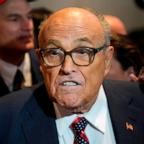Michelle Obama: Many 'Didn't Think They'd Live to See the Day'
Barack Obama's wife tells Charles Gibson she's waiting to hear his speech live.
Aug. 28, 2008— -- When Sen. Barack Obama formally accepts the Democratic nomination at Invesco Field stadium in front of 80,000 people, Michelle Obama will be in the crowd, listening to her husband's speech for the first time.
"I like to feel the same thing that everyone else is going to in this stadium," she told ABC News' Charlie Gibson today at Invesco Field. "He also started to tell me how the ending was going to go, and I stopped him again. I said, 'I don't want to know. I want to feel it tonight.'"
"I think tonight we'll have a chance to step back and breathe in and take it in and think about what this means for the country now, and what it'll mean for our kids in the future," she said.
Watch the interview on "World News" at 6:30 p.m. ET and watch Gibson, Diane Sawyer and George Stephanopoulos at the Democratic convention tonight at 10 ET on ABC.
Obama, the first black major party presidential candidate, addresses the nation on the 45th anniversary of Dr. Martin Luther King Jr.'s "I Have a Dream" speech.
It "is pretty powerful, even for someone like me and Barack who are so busy doing it, that sometimes you don't get a chance to, to step back," she said.
"There were so many people who didn't think they'd live to see the day," she said. "So many people of a variety of backgrounds who remembered that speech were there, and fought the fights, and had the hopes and dreams for the next generation. And to see it materialize in some small way, through this process, I think moves the nation, no matter who you're supporting."
Despite the magnitude of this milestone, Gibson noted how there has been little mention of race at the Denver convention.
"I think that the issues that are affecting the country really transcend race and gender and age," the potential first lady said. "When someone is struggling to pay to put gas in their car, when a person has lost their job, and doesn't have health care, and they're worried about their kids' college education, those problems know no racial boundaries."




